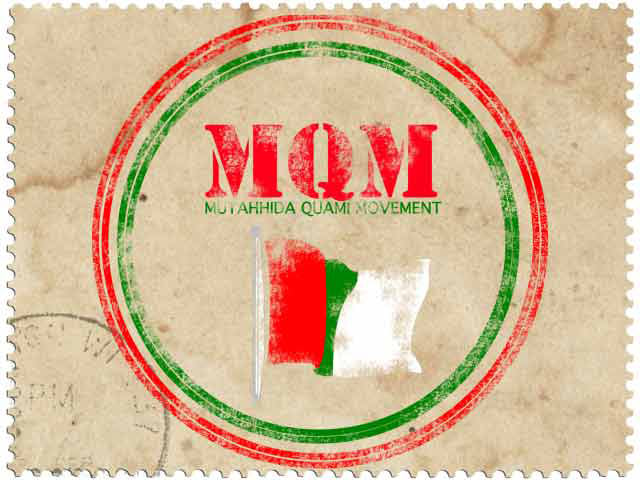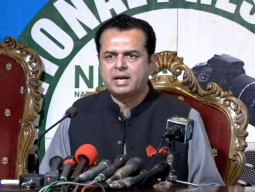
The party survived similar crises in the past - in 1991, 1992, 1993 and 1994 - during which it faced military and police operations, and lost key leaders. This time, however, it seems more like a political crisis and there appears to be a sense of realisation within the party that ‘all is not well’. MQM is also under pressure because it mishandled the situation to counter the propaganda against its leadership in both Pakistan and London since the murder of Pakistan Tehreek-e-Insaf’s Zahra Shahid Hussain.
The party has taken some major decisions since the unfortunate incident at MQM headquarters, Nine Zero, on Sunday morning - an incident quite embarrassing for party veterans because the MQM is considered the country’s most disciplined party along with Jamaat-i-Islami (JI). Now, its chief Altaf Hussain had suspended the Karachi Organisational Committee, the Rabita Committee and the committee handling Nine Zero’s affairs. These changes occurred even though the party swept the polls in the city and retained its 17 National Assembly and 37 provincial seats - showing that there is more to the crisis than merely the election results.
Back to the roots
In 1984, the All Pakistan Mohajir Student Organisation formed in 1978, gave birth to the Mohajir Qaumi Movement and after almost 10 years, the word ‘Mohajir’ was replaced by Muttahida. In 1993, MQM abandoned its political structure of chairperson, secretary general, joint secretaries, etc, and replaced them with the Rabita Committee. The decision came after the assassination of its only chairperson, Azeem Ahmad Tariq.

The dissolution of the Rabita Committee is not a first, but it is definitely one of the major overhauls since 1991 when the party sacked several leaders, and sector and unit in-charges, including Afaq Ahmad and Aamir Khan.
Present dissolution
The present dissolution of the committees apparently has a lot to do with their failure to misread new political realities. These committees failed to pay attention to complaints against extortion, land grabbing and forced occupations being carried out in the name of MQM. This annoyed Altaf Hussain. He was also unhappy with his Pakistani leadership for failing to counter the negative perception about the party.
It is also true that the MQM has witnessed a decline in its vote bank, much like the Pakistan Peoples Party and the JI. Several people who voted for the MQM in the past elections chose PTI candidates instead.
The surviving founding members of the MQM - Altaf Hussain, Tariq Javed, Zareen Majeed, Kishawar Zehra, Ahmad Saleem Siddiqui and Aminul Haq, who are still active in the party in one way or the other - would never have imagined they would become the undisputed ruler of urban Sindh when they were laying down the foundations of APMSO.
Since then, MQM has won three local bodies’ and six general elections and is still the second largest party in Sindh.
The birth of the MQM was a result of the ethnic dimension of Sindh, which remains the same today. Thus, the MQM may be down but is certainly not out. It will be interesting to see if the party will be born again or will there just be a change of a few faces. It is certainly time for Altaf Hussain and his close aides to revisit their policies and make sure they are aware of the ground realities.
Published in The Express Tribune, May 24th, 2013.
COMMENTS (10)
Comments are moderated and generally will be posted if they are on-topic and not abusive.
For more information, please see our Comments FAQ









1732355030-0/BeFunk_§_]__-(41)1732355030-0.jpg)







@kadir: I can do it in other articles too, it doesnt have to be MQM specific
How stupid is this - have you gone to the mqm website and checked the new members list for the interim members of rabita committe - same people. Mazhar mian at least do this much research before publishing your article
@Aysha: Do you really have to do MQM PR in every tribune article? everytime?
Its time for this great urban party to address those issues of its supporters which in fact were the reasons behind formation of MQM. First and foremost is the problem of Quota System in Sindh which limits the opportunities for urban youth in education and government jobsl Secondly the prevailing sense of insecurity amongst its voters and supporters in Sindh, Karachi in particular.
@Aysha: Your being sarcastic, right?
MQM is a movement not a political party, we support Qaid-e-Tehrik Altaf Hussain and their ideology realism and practical ism. MQM is a moderate, liberal, democratic movement and fighting against feudal, by birth politicians, Taliban/Qaida and all type of terrorist gangs and groups. Long Live Pakistan
@san: schooled exxageration
MQM, a thriller, does not cease to amaze. May it be its young, educated, dynamic leadership, bold and open stance against Taliban, its leader-altruism personified, calling out when the coallition partner is out of line (whatever the price may be of doing it), the shadow budget, land reform bill or the evolution of the party, the ladies jalsa and the list goes on, even the singing skills demonstrated by the top leader, nothing sells like MQM.
May only good comes out of the process, best wishes to this progressive party
You forgot to mention that the elected workers of MQM were beaten by their own progressive and liberal workers.
A very timely and well written article. MQM should realize that this is not the time of simply changing the faces, this time a paradigm shift is required and all the announcements made by Altaf Hussain regarding land misuse, contractor ship in departments, etc must be observed in letter and spirit. One thing more should be checked is that the office bearers must not be Government servants.
The rabita committee comprised of mostly government servants including Saif yar khan, Javed Kazmi, Shakir Ali, Anis Qaimkhani the convenor were all employees of KWSB.